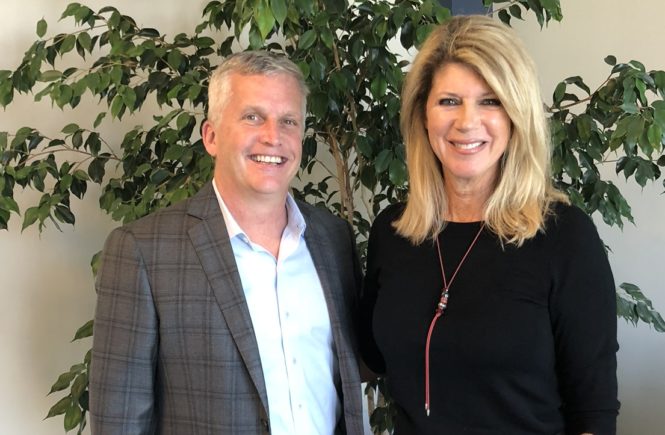Podcast: Play in new window | Download (Duration: 48:34 — 66.7MB)
Dr. John Storment, a top-ranked fertility specialist in Louisiana, always dreamed of being a surgeon. However, he chose to specialize in Reproductive Endocrinology when he discovered he could combine his love of surgery with the ability to help bring new life into the world. Storment’s specialty is rare, as only about 25 to 30 medical students in the U. S. graduate each year certified in Reproductive Endocrinology and they tend to practice in dense metropolitan areas with large populations.
Storment wanted to relocate to Lafayette after completing his fellowship in reproductive endocrinology at the University of Vermont College of Medicine. A member of St. Thomas More’s first graduating class of 1983, he and his wife, Amelie, returned to Louisiana in 1999 and have never looked back.
In this episode of Discover Lafayette, Dr. Storment shared with Jan Swift the innovations that have occurred in reproductive endocrinology over the past 15 years; medical breakthroughs have opened previously unknown methods to successfully assist couples in realizing their dream: a viable pregnancy that results in the birth of a healthy child.
Infertility means not being able to get pregnant after one year of trying (or six months if a woman is 35 or older). Women who can get pregnant but are unable to stay pregnant may also be infertile. About 12 percent of women (6.1 million) in the United States ages 15-44 have difficulty getting pregnant or staying pregnant or carrying to term, according to the Centers for Disease Control and Prevention (CDC).
In the early days of reproductive medicine, correction of uterine and fallopian tube abnormalities was the only option available to help couples trying to conceive. Even when there was insemination of the husband’s sperm, there was only a 15% success rate.
On July 25, 1978, Louise Brown, the first “test tube baby, was born through In Vitro Fertilization. In the early days of IVF, the odds of successful pregnancy improved, but it was still only viable about 1/3 of the time. Today the odds are closer to 50% for women age 35 and younger.
IVF is still one of the most recognizable treatments for infertility. Combined with the even newer field of genetic testing, Dr. Storment is offering cutting edge medical treatments to patients whom have been unable to conceive or whom have tested positive for recessive genetic disorders.
The interview focused on three main ways Dr. Storment counsels and treats his patients:
- The use of technology to increase chances of pregnancy and minimizing the risks of multiple pregnancies.
- Encouraging women who have delayed having a family or are undergoing cancer treatments which may render the female sterile to cryopreserve their eggs (oocyte cryopreservation). The ability to successfully freeze eggs (versus embryos) is relatively new. New breakthroughs in the best manner to freeze eggs use vitrification that removes the water from the egg cell. Egg cells have a higher concentration of water than embryos and removing the water before freezing helps to ensure a successful the process.
- He encourages his patients to focus on metabolism and diet. An unhealthy lifestyle may adversely impact ovulation and fertility. The interview definitely has some humorous stories as to how patients may resist Dr. Storment’s prescription to give up smoking and fried foods! Sometimes a few simple changes greatly enhance a patient’s ability to conceive, especially for a patient that is insulin resistant. Dr. Storment has three rules to remember: Cut back on soft drinks; throw out all foods in a bag or box, and give up fast food. Not only will you have an easier time processing nutrients and improve your health, you may not need fertility treatments.
Dr. Storment is most excited about the possibilities that preimplantation genetic testing (PGT) offers. The goal of PGT is to increase the chance of selecting a healthy embryo that will develop into a healthy baby. PGT can be used to identify approximately 2,000 inherited single gene disorders and tests an embryo before transfer to the uterus for implantation to see if it has the right number of chromosomes. Recent research found that having the wrong number of chromosomes is the most common cause of embryos not implanting. PGT is generally used by couples with a family history of a serious or deadly disease who worry about passing it on to their offspring. To give you an idea of the size of an embryo, about 15 embryos could fit on the head of a pin. When the embryo hits about 120 cells, they should be implanted for greatest chance of pregnancy. The field has improved in effectiveness dramatically just in the past 8 years and is a fascinating subject to delve into.
The most traditional misperception about infertility is that it is attributable to the female partner and the woman is the one that needs to be treated. In fact, the #1 single cause of infertility is male factor, which is typically decreased sperm count or mobility. Male factor infertility is the easiest to test yet often not the “go to” solution.
Compassionate care and technical competence have led Dr. Storment to be recognized repeatedly over the past several years as tops in his field in both peer and patient reviews: Castle Connolly’s guide to America’s Top Doctors in 2014, 2015, 2016, and 2017; Vitals.com’s Compassionate Doctor certification and Patients’ Choice Award; Acadiana Profile’s list of Top Doctors in Reproductive Endocrinology; and Listed Among Nation’s Best Doctors – 2012, 2013, 2014, 2015, 2016, and 2017.
Only a quarter of healthcare insurers offer coverage for infertility treatment and it can be cost-prohibited for many deserving families. Each spring, Dr. Storment awards a free cycle of in vitro fertilization (IVF) to a couple struggling to have a baby through his program called Gift of Hope. Since 2006, there have been 16 Louisiana couples chosen for the Gift of Hope, eight of which conceived and five babies have been born as a result. “We started the program as a way to help Louisiana couples undergo IVF who could not otherwise afford it,” said Storment. Gift of Hope donors include Dr. John Storment and Dr. Susan Conway, infertility specialists at Fertility Answers, Women’s & Children’s Hospital, Sheridan Healthcare, and Louisiana Anesthesiology.
Storment’s two state-of-the-art, assisted reproductive technology centers, known as Fertility Answers, include full service clinics and labs in Lafayette and Baton Rouge. The facilities treat patients in over two-thirds of Louisiana in 40 plus parishes.
For more information, please visit https://www.fertilityanswers.com. The website is full of heartwarming success stories as well as the beautiful babies who have been born to loving parents. Enjoy!
Special Thanks to Fertility Answers for its support of Discover Lafayette, and to Rader Solutions for producing our show.


